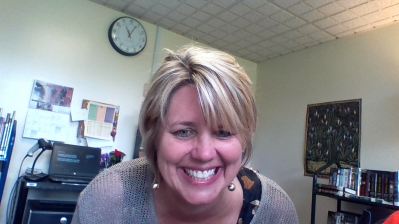Empowering Learning Through Leadership: Instructional Leadership
Update December 2020:
This web page is a companion to the 2016 version of the School Library Program Rubric. NYSED released an updated School Library Program Rubric in December 2020.
Student Snapshot: Decisions in the school community that affect student learning benefit from the expertise of the library media staff and program.
The Center for Educational Leadership (n.d.). states that “The work of instructional leaders is to ensure that every student receives the highest quality instruction each day. Doing so requires that instructional leaders lead for the improvement of the quality of teaching and for the improvement of student learning. Instructional leadership encompasses the following: learning-focused, learning for both students and adults, and learning which is measured by improvement in instruction and in the quality of student learning; resides with a team of leaders of which the principal serves as the "leader of leaders; contains a culture of public practice and reflective practice which is essential for effective instructional leadership and the improvement of instructional practice; addresses the cultural, linguistic, socioeconomic and learning diversity in the school community; and focuses upon the effective management of resources and of people — recruiting, hiring, developing, evaluating — particularly in changing environments.”
Source: Center for Educational Leadership. "4 Dimensions of Instructional Leadership." University of Washington: College of Education.
Citation for Photo: BOECER Librarian. Open Education Resources: Librarians, Leadership and Opportunity. 2014. Douglas College, New Westminster, BC. Flickr.
This web page features a photo from BOECER Librarian, available under Creative Commons Attribution-ShareAlike 2.0 Generic license.
In Practice
Toolkit for Promoting School Library Programs
Description: School librarians provide narratives and stories about successful leadership.
Resource/Citation: American Association for School Librarians. “Toolkit for Promoting School Library Programs.” American Association for School Librarians.
What Do TLs Teach?
Description: Two school librarians inform on the areas of focus and instruction in their school library program.
Resource/Citation: Valenza, Joyce and Gwyneth Jones. “What Do TLs Teach?”. ABC-CLIO, 2016.
On Common Core: One Librarian’s Success Story
Description: One step at a time, a middle-school librarian on Staten Island, NY, is helping the school move on the new standards.
Resource/Citation: Jacobs-Israel, Melissa. “On Common Core: One Librarian’s Success Story.” School Library Journal, 2013.
Enhancing Teaching and Learning, Third Edition: A Leadership Guide for School Library Media Specialists
Description: Donham's latest, revised edition of this classic shows school librarians how to be proactive in shaping instruction by developing and implementing a library media program that is integrated within the total educational experience. It demonstrates how to interact and collaborate with teacher partners, administrators, and community members regarding curriculum, teaching and learning.
*Resource/Citation: Donham, Jean. Enhancing Teaching and Learning, Third Edition: A Leadership Guide for School Library Media Specialists. Neal-Schuman, 2013.
10 Easy Leadership Ideas to Help School Librarians Become Leaders on Their Campuses
Description: This document serves as a planning document for school librarian media specialists. It helps to establish leadership goals and ideas.
Resource/Citation: Nassar, Nance. “10 Easy Leadership Ideas to Help School Librarians Become Leaders on Their Campuses”. Colorado State Education Department.
AASL joins the coalition for Future Ready Schools
Description: The American Association of School Librarians (AASL) has joined the national movement for Future Ready Schools as a coalition partner. The Alliance for Excellent Education and U.S. Department of Education are leading the Future Ready Schools effort with the support of the Leading Education by Advancing Digital (LEAD) Commission and the vast coalition of national experts.
Resource/Citation: Habley, Jennifer. “AASL joins the coalition for Future Ready Schools”. American Library Association, 2015.
Librarians as Change Agents: The Expertise is Right Here
Description: In this webinar, school librarians share how they have been able to impact key curricular and digital decisions; thus serving as an influential voice in their district. They also share several ways to enrich students’ learning and engage the school community in their program throughout the year.
Resource/Citation: Ray, Mark, Rob Wagner, Angela Vahsholtz-Andersen, and Traci Chun. “Librarians as Change Agents: The Expertise is Right Here”. Follet Community, 2016.
In Theory
Educating Pre-Service School Librarians for the Instructional Partner Role: An Exploration into University Curricula
Description: The findings of this case study demonstrate a tendency for school librarian preparation programs to assign different priorities to the five roles identified by AASL; developing the instructional partner role was not ranked first for most of the programs under study. These programs also integrate into their courses various textbooks, book chapters, articles, and other resources focused on instructional partnerships. The results of this case study suggest that universities and colleges that prepare candidates for practice do not teach with a unified voice when it comes to helping preservice school librarians prepare to practice the instructional partner role.
Resource/Citation: Moreillon, Judy. “Educating Pre-Service School Librarians for the Instructional Partner Role: An Exploration into University Curricula”. School Library Research, vol. 17, 2014, pp. 1-25.
School Librarians as Teacher Leaders
Description: School librarians of the 21st century have much to offer as they fulfill the roles defined for them by the 2009 Empowering Learners: Guidelines for School Library Programs. The 21st-century school librarian serves as teacher, instructional partner, information specialist, program administrator, and leader within the school. The author suggests that today's school librarian, as an active member of the school's instructional staff, is a leader for teaching and learning and provides concrete examples of library leadership in action.
*Resource/Citation: Church, Audrey R. "School Librarians As Teacher Leaders." Delta Kappa Gamma Bulletin, vol. 77, no. 3, 2011, pp. 10-12.
Educating for School Library Leadership: Developing the Instructional Partnership Role
Description: This research report describes a content analysis study conducted in 3 sections of LS5443: Librarians as Instructional Partners, an online graduate course. The purpose of the study was to investigate course features, assignments, tools, and resources that made the greatest change in candidates' understandings of the competencies needed to enact instructional partnerships. The findings suggest dispositions, communication skills, and collaborative practices, including the use of technology tools required to collaborate with 3 or more classmates, influenced study participants' previously held understandings of instructional partnerships.
*Resource/Citation: Moreillon, Judi. "Educating For School Library Leadership: Developing The Instructional Partnership Role." Journal Of Education For Library & Information Science vol. 54, no.1, 2013, pp. 55-66.
Leadership and the School Librarian
Description: Focusing on the leadership of school librarians, this article discusses the importance of librarians coordinating school wide reading events, serving as technology coaches urging teachers to use the right technology to improve student learning, and meeting the needs of stakeholders as a means of building influence in school community.
*Resource/Citation: Wittig, Kurt. "Leadership And The School Librarian." School Library Monthly, vol. 31, no. 2, 2014, pp.32-33.
School Librarians Are Rising School Leaders
Description: This article examines how school librarians can play an important role as schools use digital tools and resources regularly.
Resource/Citation: Devaney, Laura. "School Librarians are rising school leaders." eSchool News, Project Connect, Oct. 2013.
Project Connect: Empowering Educators as We Master as a Digital World
Description: Project Connect is a panel of industry thought leaders from the preK-12, professional association, and higher education space working together to advocate for powerful school libraries and future ready librarians. Project Connect includes case studies, news articles, and various resources about the influence of school librarians and their role as leaders.
Resource/Citation: Follet Learning. Project Connect. Follet Learning, 2016.
The Empire State Information Fluency Continuum
Description: The ESIFC emphasizes the importance of inquiry in learning and establishes information fluency standards for grades K-12, which are aligned with Common Core Learning Standards. The fusion of the two sets of standards aims to create students who are capable of absorbing and applying appropriate information to any situation. The document identifies three information literacy standards which encourage students to be thinkers, explorers, and citizens and outlines the essential steps of inquiry: connect, wonder, investigate, construct, express, and reflect. The continuum also includes grade-specific benchmarks for information skill development and sample diagrams and worksheets which may be used to assess students’ progress. Finally, there is a helpful chart for administrators, teachers, and librarians that links progress along the fluency continuum with various Common Core Learning Standards in reading, writing, and speaking & listening. The continuum helps apply Common Core Learning Standards to real-world classroom teaching and is a great resource to use for grade-specific lesson planning.
Resource/Citation: New York City School Library System. “The Empire State Information Fluency Continuum”. Engage NY, 7 Nov. 2014.
Latest Study: A Full-Time School Librarian Makes A Critical Difference in Boosting Student Achievement
Description: This article provides information on how student achievement suffers when schools lack libraries that are staffed by full-time librarians.
Resource/Citation: Kachel, Debra E., and Keith Curry Lance. “Latest Study: A Full-Time School Librarian Makes A Critical Difference in Boosting Student Achievement”. School Library Journal, March, 2013.
Consultant
Name: Sue Kowalski
Email: kowalski423@yahoo.com
Bio: Sue Kowalski is the school librarian at Pine Grove Middle School. She is an active leader through NYS and national organizations.
*To access restricted database articles speak with your school librarian or public librarian.







